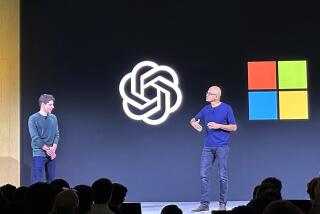AOL Alters the Code of Its Messaging Software Again
- Share via
America Online this weekend altered the code for its Instant Messenger software for the third time in four days to block out users of a competing Microsoft system, as its battle with archrivals over Internet chatting programs blossomed into a full-scale war.
AOL also sent Microsoft a letter, it emerged Monday, suggesting that it was open to “a legitimate arrangement” for coordinating the two companies’ messaging systems that would allow users of the two systems to communicate. In the letter, sent Friday, AOL invited Microsoft to initiate talks to settle their differences.
Microsoft officials said late Monday that they had not yet decided how to respond.
“It was a private letter that gave their viewpoint,” said Deanna Sanford, lead product manager for Microsoft Network, or MSN. Sanford said Microsoft saw no reason to change its own product. Asked if the AOL letter amounted to a peace offering, she said, “That’s not my impression.”
Microsoft software engineers, meanwhile, worked around the clock to respond to the latest AOL changes with their own new fix that would allow Microsoft Network subscribers to chat with friends on AOL.
And Microsoft, Yahoo, Prodigy Communications and other hosts of messaging and chat sites said they would hold a meeting to set new industry standards to counter the AOL blockade.
“They’ve violated the fundamental covenant of the Internet,” said Bill Kirkner, chief technology officer at Prodigy, a White Plains, N.Y.-based Internet service provider. “They no longer have credibility. Now we’re going to develop standards that are different” from AOL’s.
AOL insisted Monday it is blocking rival services only because they typically require recipients who are AOL members to type in their AOL passwords before responding. AOL said it considers that a potential security breach.
“There are scams and schemes that are very sophisticated,” said AOL spokeswoman Tricia Primrose. “At the end of the day our goal is that there should be open and common standards. We just want to make sure it is done right.”
Kirkner said if it was simply a matter of security, AOL could have talked to Prodigy and other rivals about ways of getting around the problem. Instead, Kirkner said, AOL tried to charge Prodigy for sending messages to AOL. That move was the equivalent, Kirkner said, of early developers of the World Wide Web suddenly laying a new tax on every Web site.
At issue is a relatively novel technology that allows Internet users to set up their own “communities” of friends and acquaintances so they can see which of the group is online at any given time and therefore initiate instant chats.
AOL’s two systems, known as ICQ and Instant Messenger, have become major successes over the last year. The online service now dominates the field with about 78 million registered users of the programs, including those who use the software with services other than AOL.
The battle over the systems began when AOL decided on Thursday to block messages coming to its subscribers from users of competing services, including Yahoo and MSN. Microsoft engineers promptly contrived a way to overcome the AOL blockade, only to be blocked by a further AOL alteration. Since then, the cat-and-mouse game has continued.
AOL critics, meanwhile, have said that the online service’s decision to block outside messages undermines its position in two other high-stakes battles: its quest to gain access to the high-speed Internet networks being introduced around the country by cable TV operators, and its fight against Microsoft’s alleged drive to monopolize the market for Web browser software. AOL is the owner of Netscape, Microsoft’s principal rival in the Web browser market.
“The unbridled hypocrisy of AOL leaves me stunned,” Leo Hindery Jr., chief executive of AT&T; Broadband and Internet Services, said in an interview Monday. “This is absolutely the same as Microsoft’s insisting that people use their browser. In AOL’s case, it’s ‘you use my chat.’ ”
AT&T; is the nation’s second-largest cable company. As the controlling shareholder of @Home, which provides high-speed Internet service on an exclusive basis to cable TV subscribers across the country, it is AOL’s chief adversary in the latter’s battle to win access to high-speed cable data networks.
Observers say potential allies such as Yahoo are now less likely to side with AOL in the broader battle against Microsoft.
And the company is getting knocks from leaders it has long courted in the so-called “open source” movement. This movement, which is highly critical of Microsoft, tries to encourage software companies to publish the basic programming, or “source code,” of their software to encourage independent programmers to design improvements.
“You can either be open or protect your turf; you can’t do both,” said Eric Raymond, a key proponent of the movement who has praised AOL’s past support for keeping Netscape’s browser open. “I’m surprised they don’t understand that.”
In fact, it was AOL’s decision to publish the source code of Instant Messenger last year that led to the current contretemps.
Prodigy was the first to use the published material from AOL to come up with its own instant messaging software in May. But six weeks later, AOL blocked the service and abruptly removed the software code for Instant Messenger from its Web site.
“This was the litmus test,” said Prodigy’s Kirkner. “If they believed in open source, they would have cracked open the champagne when we came out with better software. Instead, they changed their mind and said the software was proprietary.”






